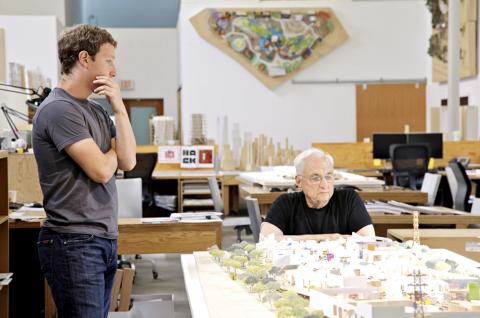Facebook said on Friday it had hired renowned architect Frank Gehry to design the company’s campus expansion, which includes a new building with a rooftop garden.
“When it is completed, we hope it will provide a paradise workspace for the 3,400 engineers who will one day fill it,” a company statement said.
The expansion to the campus in Menlo Park, California, will be designed by the Canadian-born Gehry, known for the Guggenheim Museum in Bilbao, Spain, and the Walt Disney Concert Hall in Los Angeles, among others.

Photo: Reuters
Gehry, known for his deconstructive style and buildings that sometimes appear unfinished, also designed the Stata Center at the Massachusetts Institute of Technology and the Cinematheque Francaise in Paris.
“At every step of planning the new building, Frank has taken into account our engineering culture,” Facebook said. “It will be a large, one-room building that somewhat resembles a warehouse. Just like we do now, everyone will sit out in the open with desks that can be quickly shuffled around as teams form and break apart around projects.”
The new building will include “cafes and lots of micro-kitchens with snacks so that you never have to go hungry,” the statement said.
“And we’ll fill the building with break-away spaces with couches and whiteboards to make getting away from your desk easy,” it said.
Facebook last year took over the headquarters of Sun Microsystems in Menlo Park, moving from cramped headquarters in nearby Palo Alto.
The company seeks to break ground on the new building early next year, with hopes for “a quick construction.”
It said the exterior also “takes into account the local architecture” and that “a tonne” of trees would be planted on the grounds and on the rooftop garden.
“The raw, unfinished look of our buildings means we can construct them quickly and with a big emphasis on being eco-friendly,” Facebook said.
Facebook will maintain its current campus and use an underground tunnel to connect the two areas.

Intel Corp chief executive officer Lip-Bu Tan (陳立武) is expected to meet with Taiwanese suppliers next month in conjunction with the opening of the Computex Taipei trade show, supply chain sources said on Monday. The visit, the first for Tan to Taiwan since assuming his new post last month, would be aimed at enhancing Intel’s ties with suppliers in Taiwan as he attempts to help turn around the struggling US chipmaker, the sources said. Tan is to hold a banquet to celebrate Intel’s 40-year presence in Taiwan before Computex opens on May 20 and invite dozens of Taiwanese suppliers to exchange views

Application-specific integrated circuit designer Faraday Technology Corp (智原) yesterday said that although revenue this quarter would decline 30 percent from last quarter, it retained its full-year forecast of revenue growth of 100 percent. The company attributed the quarterly drop to a slowdown in customers’ production of chips using Faraday’s advanced packaging technology. The company is still confident about its revenue growth this year, given its strong “design-win” — or the projects it won to help customers design their chips, Faraday president Steve Wang (王國雍) told an online earnings conference. “The design-win this year is better than we expected. We believe we will win

Chizuko Kimura has become the first female sushi chef in the world to win a Michelin star, fulfilling a promise she made to her dying husband to continue his legacy. The 54-year-old Japanese chef regained the Michelin star her late husband, Shunei Kimura, won three years ago for their Sushi Shunei restaurant in Paris. For Shunei Kimura, the star was a dream come true. However, the joy was short-lived. He died from cancer just three months later in June 2022. He was 65. The following year, the restaurant in the heart of Montmartre lost its star rating. Chizuko Kimura insisted that the new star is still down

While China’s leaders use their economic and political might to fight US President Donald Trump’s trade war “to the end,” its army of social media soldiers are embarking on a more humorous campaign online. Trump’s tariff blitz has seen Washington and Beijing impose eye-watering duties on imports from the other, fanning a standoff between the economic superpowers that has sparked global recession fears and sent markets into a tailspin. Trump says his policy is a response to years of being “ripped off” by other countries and aims to bring manufacturing to the US, forcing companies to employ US workers. However, China’s online warriors